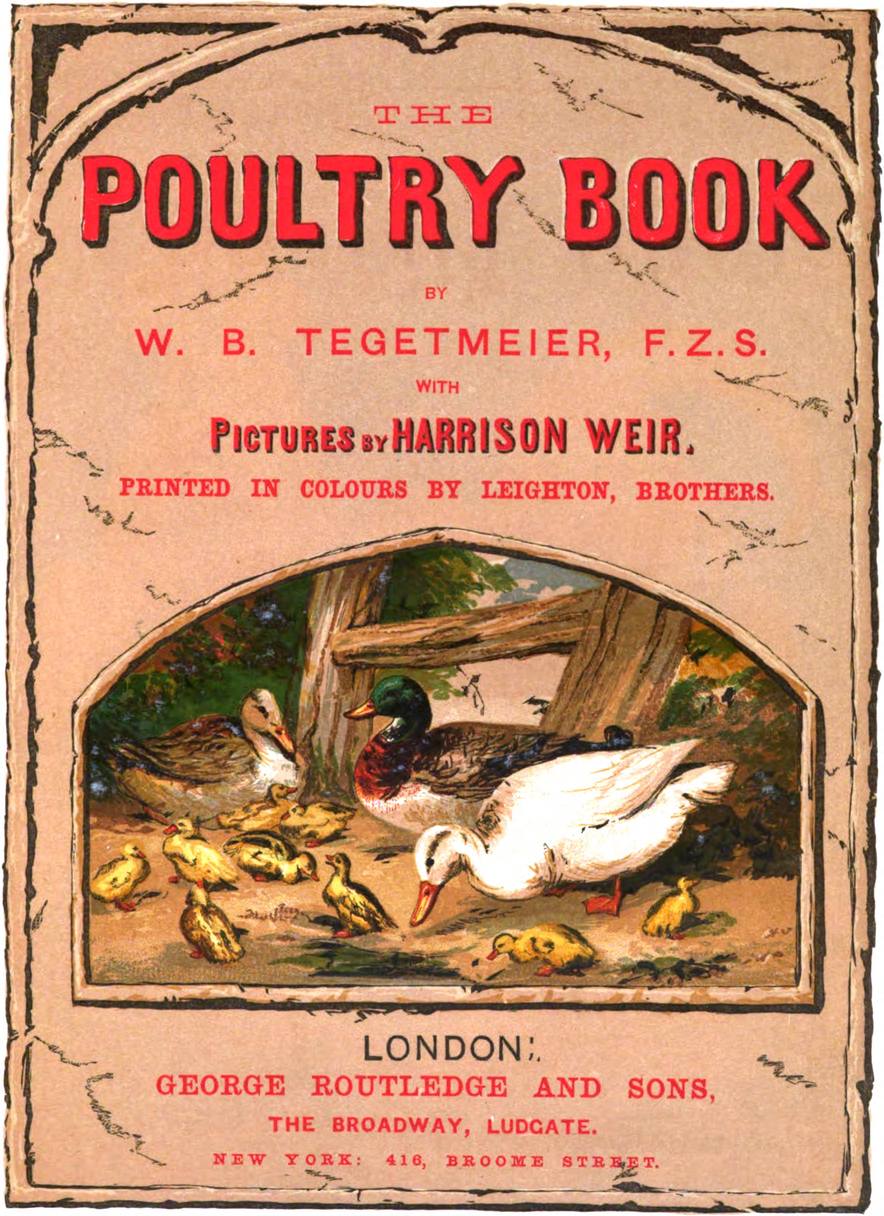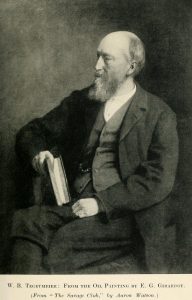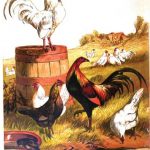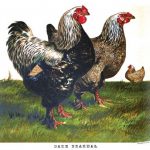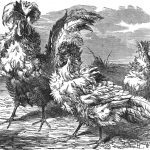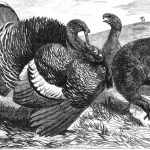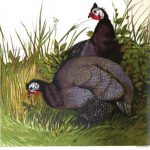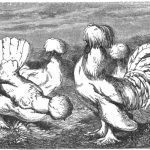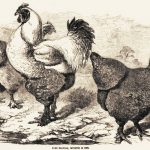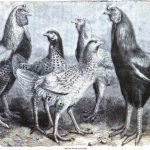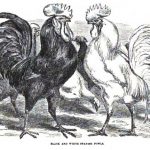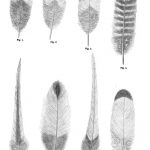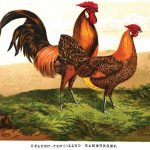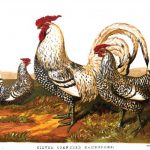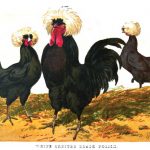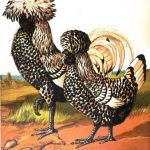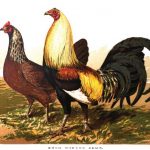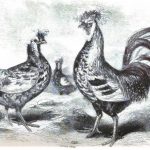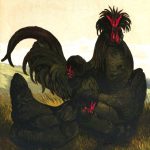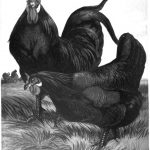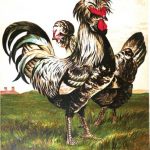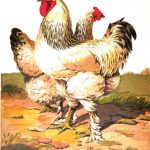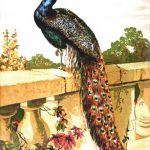As with its predecessor, the colour pictures were by the famous Harrison Weir. Printing was still by Leighton, Brothers who had printed the earlier edition. It is subtitled “Comprising the breeding and management of profitable and ornamental poultry; their qualities and characteristics”; to which is added “The Standard of Excellence in Exhibition Birds, authorized by the poultry club “
His work on pigeon breeding became a collaboration with Charles Darwin and his interest in homing pigeons led to their use a messengers by the armed forces. He also organised the first pigeon races. Not a bad epitaph for anyone.
The Origins of Bantam Chickens
From the Poultry Book of 1867
It is usually stated in works on Poultry, that the smaller varieties of domesticated fowls, known under the general name of Bantams, are the descendants of certain distinct species...
The 1867 edition of the Poultry Book was in contradiction to the earlier 1853 edition regarding the origins of the Brahma Chickens as the excerpt below shows.
Origin of Brahma Chickens
ALTHOUGH Brahmas are amongst the latest introductions into...
This article on the origin of the frizzled fowl is extracted from The Poultry Book of 1867. Note: The Mr C Darwin referred to is the famous Charles Darwin, author of the work that introduced the theory of evolution On the Origin of Species
Origin...
Mr Tegetmeier starts with a very controversial proposition regarding the origin of the turkey as a domestic animal.
Origin of the Turkey
From the Poultry Book 1867
The origin of the Turkey of our farm yards is, like that of many other of...
From The Poultry Book 1867
The Guinea Fowl
Guinea fowls, of which there are eight distinct species at present known to naturalists, are all natives of the African continent, or of the adjacent Island of Madagascar.
They constitute the genus N...
The old spelling of Sebastopol which is now commonly called Sevastopol seems to have stuck when applied to this breed of goose. The curled feather of Sebastopol geese were much prized as being the best down for stuffing pillows. Nowadays they are...
Extract from The Poultry Book of 1867
Sultan Fowls
Sultan fowls, or Feather-footed White Polish, are a very elegant and pleasing variety. They were first imported into this country from Turkey, by Miss Watts of Hampstead. Their exceedingly ...
Dark versus Light Brahma Chickens
There was some argument as to whether the dark and light Brahmas were the same breed or actually from different origins. Judging from these wood engravings from the 1867 edition of the Poultry Book there conformation...
From the Poultry Book of 1867 - I just love the name "Begum Pilly Gaguzes"
The Domestic Fowls of India
In the chapter on the Malay fowls, we have alluded to the general characters of the domesticated Indian varieties, some of which are of large...
THE SPANISH CHICKENS
The geographical names by which the majority of the different breeds of our domestic poultry are at present known to us are unquestionably erroneous.
Cochins were unknown in Cochin China until introduced into that country ...
Feather of Lancashire Mooney Hen
Feather of Golden Pheasant Hen
Feather of Silver Pheasant Hen
Wing Feather of Silver Mooney Chicken
Hackle of full-feathered Silver Mooney Cock
Hackle of Hen-feathered Silver Mooney Cock
Saddle...
Pencilled Hamburgh chickens of both varieties are scarcely to be surpassed in beauty by any of the other denizens of the poultry yard: the slight compact form of the hens; their sprightly, active, cheerful carriage; and the contrast of their ample...
In the Silver spangled Hamburgh chickens, as in the Golden, two different varieties are included. The Lancashire Silver Mooneys, which were bred and exhibited in Lancashire by the old clubs, and the Yorkshire Silver-pheasant fowls.
Lancashire Silver...
Of all the breeds, the Polish are my favourite. They just remind me of Edwardian ladies with their large hats, elegantly promenading up and down the pier at Brighton.
Sadly the scan wasn't very good but I've done my best with it.
There's a long...
Some help and tips on keeping Polish chickens from the Poultry Book 1867
Importance of Shelter for Keeping Polish Chickens
There is little doubt in my mind that this (illness) is greatly induced by the large quantity of moisture the top-knots will...
In duck winged game fowl the cocks, to be correct in colour, should have the hackle nearly clear white, with a very slight tinge of straw colour, without any decided yellow tinge or dark streak on the feather.
It may be asked, Where are we to see...
In the 1860's the British woke up to the French dominance in the poultry business and French poultry breeds. In Britain there were few farmers concentrating on poultry. Most of our farmers merely had a few birds scratching around the yard and the...
I must admit I find the painting of the Crevecoeur chickens quite scary - all in black except for the red devil's horns
In the 1867 Poultry Book the editor / author Mr Tegetmeier discusses the French poultry industry which was far in advance...
On of the popular French table breeds in the 1800's, La Fleche chickens were somewhat similar to the Crevecoeurs with their combs being horn shaped. I'm not sure I'd like to meet one on a dark night though!
The Poultry Book of 1867 has just...
Houdan chickens were commonly kept in France as a meat bird. It's surprising that they could eat something so beautiful, but I suppose it made a nice change from snails and frogs legs. They are very similar in appearance to the Polish breeds with ...
We think of cross-breeding and hybrid chickens as being modern developments that have given us the extremely productive egg laying birds and super-fast growth of table birds. The curious fact is that cross breeding was known about and common amongst...
Most people refer to the peacock when talking about the species but they're properly known as peafowl with the gloriously plumaged male being the peacock and the dowdy females the peahens.
The Poultry Book 1867 had this to say about the peafowl:...

